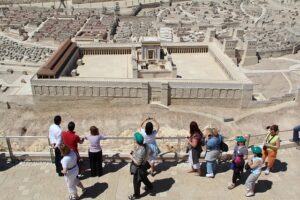
Passover was established by God as a moed (in Hebrew, ‘an appointed time’ by God of festivity in His calendar). The context of this festival is found in the book of Exodus, chapter 7 and onwards. In this story, God sent Moses to convince Pharaoh to let the Israelites go free from slavery, but he refused. God sent nine plagues to convince him, but Pharaoh persisted. Then, God sent the tenth plague that would break the Egyptian stubbornness and bring freedom for the Israelites. God announced, “Every firstborn in the land of Egypt shall die, from the firstborn of Pharaoh to the firstborn of the beasts.” He gave instructions to the Israelites so they could protect themselves from this judgment by eating a lamb whose blood would serve as protection, marking the doorposts with that blood. This dinner, known as Pesach (Passover), would be a special celebration with a significant order full of symbolism characterizing that appointment with God. “And the blood shall be a sign for you on the houses where you are; and when I see the blood, I will pass over you, and no plague shall befall you to destroy you when I strike the land of Egypt” (Exodus 12:13). What happened during that night must have been a terribly dramatic scene. God established Passover as the first of the moadim to be celebrated annually by His people to commemorate that liberation orchestrated directly by Him, speaking of His love and responsibility towards them. Finally, upon leaving Egypt, they settled in the Promised Land, and when Jerusalem became the capital of the nation with the temple as the seat of Passover, it would be a pilgrimage festival to that city and place for its celebration.
Christianity has gone through many stages of transformation, distancing itself from its true root and reason for being. By definition, a Christian is a disciple or follower of Jesus Christ, and by conviction, an imitator of Christ. When analyzing whether current Christians should celebrate Passover, the example of Christ is an important factor to consider. Although the Bible does not give us many details about Jesus’ upbringing, we know that He and His family celebrated Passover. For example, the book of Luke tells us that Jesus went with His parents every year to Jerusalem for the Passover festival. Christ continued to celebrate the festival during His adult life, even in the last days of His physical life to set an example for His followers. The four Gospels confirm His participation each year. On one occasion, He said, “Whoever has my commandments and keeps them, he it is who loves me. And he who loves me will be loved by my Father, and I will love him and manifest myself to him” (John 14:21). With this, He reminded them that an evidence of their love for Him was following His instructions, so there is no doubt that He and His disciples kept this festival.
After what has been said, the question arises: Should we celebrate the Passover dinner even without a temple? When the Temple in Jerusalem existed, many people made pilgrimages for this festival and performed sacrifices, offerings, and burnt offerings there. However, with the physical temple destroyed, those offerings are no longer necessary, as Christ was the perfect sacrifice for us once and for all. Jesus tells us before His departure, “Do this in remembrance of me” (Luke 22:19). The early church understood this command from Jesus Christ, which clearly instructed them to eat the Passover until His return, announcing that He would eat it again with us.
We have the testimony of Paul, who said about Passover in one of his letters: “Cleanse out the old leaven that you may be a new lump, as you really are unleavened. For Christ, our Passover lamb, has been sacrificed. Let us therefore celebrate the festival, not with the old leaven, the leaven of malice and evil, but with the unleavened bread of sincerity and truth” (1 Corinthians 5:7-8).
During this Passover time, we are called to joyfully remember the sacrifice of Jesus and meditate on Him, as the Lamb of God who redeems His people and saves all who believe in Him. Passover was consecrated as an ordinance for His followers by Jesus Himself, and therefore it is one of the commandments that Christians should strive to follow to the letter, without inventing new ways of celebrating it or strange sacraments.
Author: Julio Hernandez
0 Comments